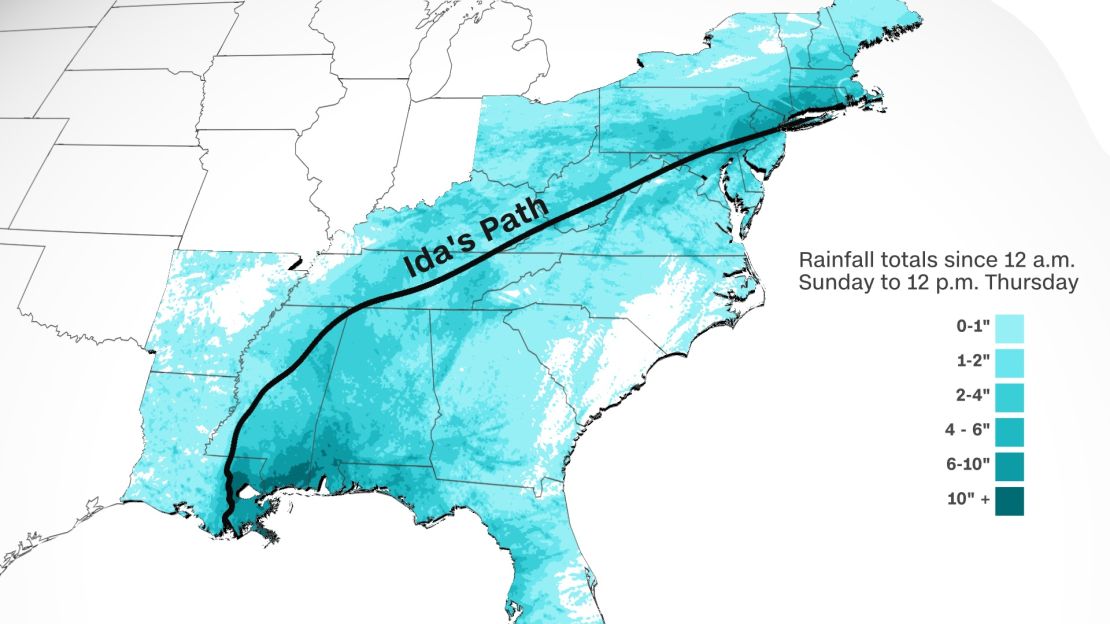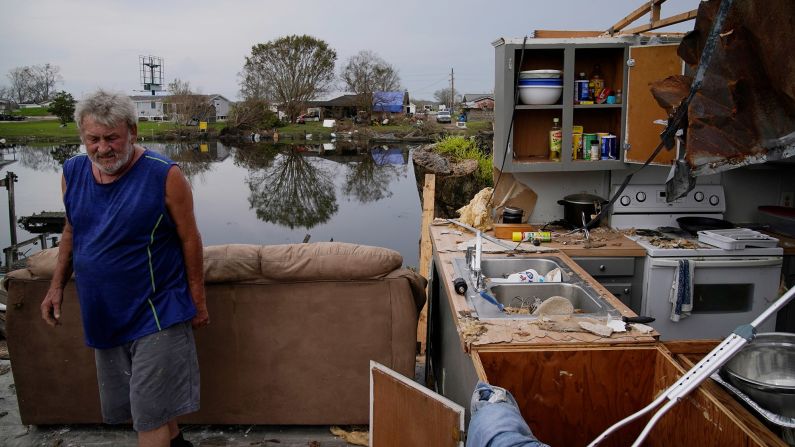Ida blasted ashore as a powerful Category 4 hurricane Sunday, slamming the Gulf Coast with devastating force. The storm surge and winds caused by Ida were so strong, they even partially reversed the flow of the Mississippi River near New Orleans – something that’s “extremely uncommon,” according to the United States Geological Survey.
But although it weakened after that, the storm continued to churn steadily north, wreaking havoc in its path. Remnants of Ida hit the Northeast on Wednesday night in what is being called a historic weather event, battering the states of New York and New Jersey.
And wherever it went, this monster storm brought with it powerful winds, flash floods and tornadoes. Right now, Ida is off the coast and gone, but flood warnings and advisories continue in the wake of the catastrophic rainfall and flooding in the region.
Even now, more than a million homes and businesses are without power because of Ida, mostly in Louisiana, according to PowerOutage.us and dozens of people have died.
Here’s what some of the devastation looks like in the aftermath of this deadly storm:

Ida slammed Louisiana with catastrophic force
The destruction after Hurricane Ida, one of the strongest storms to ever hit Louisiana, is becoming clearer by the day. Millions of Gulf Coast residents who survived Ida’s gale-force winds and deluge of rain are now facing widespread power outages that are expected to last for weeks, coupled with a period of excessive heat.
The storm plunged New Orleans into total darkness, although power has since been restored to parts of uptown, midtown and some other areas.
One New Orleans man said he and his family are sitting in their car to get relief from the sweltering heat that has followed the storm. “It has been kind of hard and you know, with a three-month-old baby and no water, no lights, nothing, it ain’t easy,” the father told CNN. But the family is now running out of supplies they had purchased ahead of the storm and are worried about what to do next.
“So, 9 out of 10, we’re going to have to either find somewhere else to go or leave from New Orleans because we can’t live like this,” the father added.

Mississippi highway washed away by rain
Mississippi was also battered by torrential rain from Ida.
According to satellite and radar estimates, the area saw 10 to 13 inches of rain, with isolated higher amounts. This, on top of already saturated ground, led to flash flooding in and around the town of Lucedale.
The incessant rain likely caused part of the two-lane Highway 26 in George County to be washed away Monday night. At least two people were killed after seven vehicles went into the 50 feet long and 20 feet deep hole created by the washout, according to authorities.
Thousands of customers were also left without power, although power has been restored in several areas since then.

Flooding and road closures in Tennessee
The state of Tennessee was not spared.
Areas west of Nashville that were decimated by record rainfall and flooding just over a week earlier received another 1.5 to 2.5 inches of rainfall from Tropical Depression Ida.
The Tennessee Emergency Management Agency reported water rescues, localized flooding and road closures due to Ida.
Before Ida, at least 18 people were killed in flooding in Tennessee’s Humphreys County. “We’ve experienced a devastating loss of life,” Waverly Police and Fire Chief Grant Gillespie said, adding that they lost more people in the flooding on August 21 than they did in a 1978 train explosion in the town.

Maryland blasted by a tornado
The Annapolis area in Anne Arundel County was one of the hardest-hit areas from a tornado confirmed by the National Weather Service, according to Ed McDonough, PIO for the Maryland Emergency Management Agency.
And in Rockville, Ida’s downpour flooded an apartment complex, leaving one person dead. Montgomery County Police say while a final autopsy is pending, the death of a 19-year-old found dead after an apartment complex flooded on Wednesday can be preliminarily attributed to the storm.
Maryland officials are continuing to work with local emergency managers to determine the need for further damage assessments.

Thousands of water rescues In Pennsylvania
In Pennsylvania, Emergency Management Agency Director Randy Padfield estimated the number of water rescues to be in the “thousands.”
First-responders and rescue teams have been tirelessly conducting water rescues for the past 15 hours and are expected to do so for at least another 10 to 12 hours. At least 100 people have been rescued from floodwaters in Philadelphia alone, according to Adam Thiel, Philadelphia Fire commissioner and director of the Office of Emergency Management.
Thiel added that the flooding the city experienced Wednesday night into Thursday morning was “historic” and reached levels “not seen in more than 100 years.”
“This is going to be a long cleanup and recovery process,” he added.

New Jersey recovering from massive flooding
In New Jersey, images of flooded streets, flooded basements and cars submerged in water were shared all night on social media.
Parts of the city of Passaic saw up to eight feet of water, at least 25 residences in Mullica Hill were destroyed or heavily damaged by a tornado, and Hoboken experienced 6.5 inches of rain in an eight-hour period, according to authorities.
At least 23 New Jersey residents died in the storm, Gov. Phil Murphy said Thursday. Murphy said the majority of the storm-related deaths were people who were caught in their vehicles by flooding and were tragically “overtaken by the water.”

Subway shut down In New York City
New York City was inundated by rain and floodwaters Wednesday night. Based on a rough estimate that the 6.8 inches of rain fell equally over all five boroughs between 7 p.m. and midnight, it means that 35 billion gallons of water fell on the city in that period.
Floodwater was seen gushing into subway stations and the streets turned into little streams with cars floating in them. A delivery man was seen with his bicycle in waist-deep water in the early hours of Thursday morning. Passengers were stranded in subway stations for hours. One passenger, Robert Hedglin, said he was stuck underground for more than an hour after his train stopped between the 59th Street and Lexington stops and shared videos of his plight on Twitter.
New York Gov. Kathy Hochul hammered home the issue of climate change Thursday. “We have no choice my friends, the future we spoke about in dire terms, that future is now, it’s happening, we’re losing life, lives we’re losing property and we cannot continue on this path,” she said.
Hochul also thanked a bus driver, Rosa Amonte, who drove passengers through three to four feet of water.
“Rosa did something that is absolutely unbelievably heroic…. Can you imagine the terror that people experienced in that moment? But she didn’t pull out of here and say I’m out of here,” Hochul added.
CNN’s Judson Jones, Alanne Orjoux, Brandon Miller, Laura Ly, Keith Allen, Maureen Chowdhury, David Williams, Kristina Sgueglia, Adrienne Vogt, Joe Sutton and Taylor Ward contributed to this report.











































































